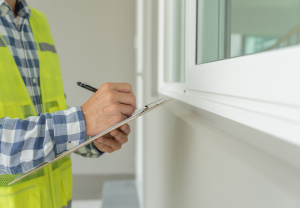Understanding the Importance of Residential Building Inspections in Adelaide
Residential building inspections are a crucial step for any homebuyer in Adelaide. This article will guide you through the various stages of the inspection process, highlight common construction violations, and provide practical advice on addressing these issues. We’ll also explore different types of inspections available, such as pool safety inspections, financial considerations, and the importance of comprehensive inspection reports.
Key takeaway: Skipping a building inspection can expose you to significant risks. Residential building inspections help ensure your future property is safe, compliant, and free from hidden defects. This step is essential to protect your investment and avoid costly repairs down the line.
The Residential Building Inspection Process
Understanding the inspection process is crucial. Here’s how residential building inspections typically unfold:
Step-by-Step Guide to the Inspection Process
Pre-Construction Phase
Planning and Permits: Before any construction begins, you need to obtain the necessary building permits. This ensures that your plans comply with local codes and regulations.
Foundation Inspection
Initial Assessment: Inspectors evaluate the foundation layout and check for proper excavation and reinforcement. Ensuring a solid foundation is fundamental.
Framing Inspection
Structural Integrity: After the framework is complete, inspectors examine the structural components like beams, columns, and joists. This step verifies that the skeleton of the building aligns with approved plans.
Mechanical Systems Inspection
Plumbing and Electrical: Inspectors assess plumbing installations, electrical wiring, and heating and cooling systems to ensure they meet safety standards. Any deviations from approved designs are noted for correction.
Pre-Drywall Inspection
Internal Components: Before walls are closed up, inspectors review insulation, vapour barriers, and fire-blocking measures. This phase helps catch issues that would be difficult to rectify later.
Final Inspection
Completion Check: Once construction is finished, a comprehensive final inspection occurs. Inspectors verify that all elements—from structural integrity to safety systems—are compliant with regulations.
The Role of Regulatory Standards in Ensuring Safe and Compliant Buildings
Regulatory standards are pivotal in maintaining construction quality and safety:
Local Building Codes: Adelaide has specific building codes that dictate everything from material usage to structural design. Compliance with these codes is non-negotiable.
Safety Standards: Regulations cover essential safety components such as fire exits, sprinklers, and electrical setups to protect future occupants.
Quality Assurance: Adhering to these standards guarantees not just legal compliance but also long-term durability and safety.
Ignoring these steps can lead to severe consequences including legal complications or costly repairs post-purchase. By following this structured inspection process, you safeguard your investment both legally and financially.
Understanding the importance of each phase in the inspection process helps in appreciating why skipping any step can be detrimental. Detailed knowledge about inspections equips you better for a smooth home-buying experience in Adelaide.
Common Construction Violations Found During Inspections and How to Address Them
Identifying construction violations during a residential building inspection is crucial for ensuring the safety and integrity of the property. Typical issues often encountered include:
Inadequate Fire Safety Measures: This can involve missing or improperly installed smoke detectors, fire extinguishers, or fire exits. The potential consequences include increased risk of fire-related injuries or fatalities.
Poor Electrical Installations: Improper wiring, overloaded circuits, and lack of grounding can lead to electrical fires or electrocution hazards.
Structural Deficiencies: Issues such as cracks in the foundation, uneven flooring, or weak load-bearing walls compromise the structural stability of the home.
Plumbing Problems: Leaking pipes, inadequate drainage systems, and faulty water heaters can cause water damage and mould growth.
Heating and Cooling System Failures: Inefficient heating and cooling systems lead to higher energy costs and uncomfortable living conditions.
Addressing these problems before moving into a property is essential. Here are some practical tips for rectification:
Engage Qualified Professionals:
Hire licensed electricians to correct any electrical issues.
Seek certified plumbers to address plumbing defects.
Consult structural engineers for evaluating and fixing foundational or load-bearing concerns.
Adhere to Regulatory Standards:
Ensure all repairs comply with local building codes and regulations to avoid future violations.
Obtain necessary permits for significant alterations or repairs.
Implement Preventive Measures:
Install adequate fire safety equipment based on recommended guidelines.
Regularly maintain heating and cooling systems through professional services to ensure proper functioning.
Document All Repairs:
Keep detailed records of all rectifications made during the process.
Provide this documentation during future inspections or when reselling the property.
This proactive approach not only ensures code compliance but also enhances the property’s safety and market value.
Different Types of Residential Building Inspections You Should Know About
Understanding the various types of residential building inspections available to homeowners in Adelaide can help you make informed decisions when buying or selling a property. Each inspection type has a specific focus, ensuring that different aspects of the property are thoroughly evaluated.
Pre-Purchase Inspections
Pre-purchase inspections are essential for potential buyers. These inspections provide a comprehensive evaluation of the property’s condition before finalising the purchase. Key areas assessed include:
Structural integrity
Roofing and exterior conditions
Plumbing and electrical systems
Heating and cooling units
Pre-Sale Inspections
Pre-sale inspections benefit sellers by identifying any issues that might deter potential buyers. Addressing these problems beforehand can lead to smoother transactions and potentially higher offers. Sellers often focus on:
Cosmetic repairs
Minor structural fixes
Ensuring compliance with local standards
Specialised Assessments
Besides general inspections, specialised assessments are crucial for detecting specific issues that might not be apparent during a standard inspection. These include:
Pest Inspections
Pest inspections identify infestations from termites, rodents, or other pests that can cause significant damage over time. Early detection allows for timely treatment and prevention of further damage.
Asbestos Inspections
Asbestos inspections are vital, especially in older homes. Asbestos exposure can lead to serious health risks, making it essential to identify and safely remove any asbestos-containing materials.
Additional Inspection Types
Other inspection categories homeowners in Adelaide might consider include:
Electrical Inspections: Ensuring all electrical systems comply with safety standards.
Plumbing Inspections: Checking for leaks, pipe integrity, and overall plumbing conditions.
Fire Safety Inspections: Verifying that fire safety measures are adequate and up to code.
By understanding these different inspection types, you can ensure that your property is safe, compliant, and ready for occupancy or sale.
The Financial Considerations Behind Residential Building Inspections: What You Need to Budget For
When planning for residential building inspections in Adelaide, understanding the inspection costs is crucial. Typically, hiring a professional inspector can range between $300 to $600. Several factors influence these costs:
Property Size: Larger homes or properties with additional structures may require more extensive inspections, increasing the overall cost.
Inspection Type: Specialised inspections such as pest or asbestos assessments might have separate charges.
Inspector Experience: Experienced inspectors with a solid reputation might charge higher fees due to their expertise and thoroughness.
It’s essential to budget for these costs early in the home-buying process to avoid unexpected financial strain. Investing in a comprehensive inspection can save you substantial amounts in future repairs and provide peace of mind regarding your property’s condition.
Why Comprehensive Inspection Reports Matter When Buying a Home in Adelaide
A comprehensive inspection report is crucial for making informed buyer decisions. It provides a detailed snapshot of the property’s current condition, highlighting any potential issues that could impact your investment.
Key Elements of a Good Inspection Report:
Clear Summary: An overview of major findings and critical issues.
Detailed Descriptions: In-depth analysis of structural components like roofing, plumbing, electrical systems, and heating and cooling units.
Photographic Evidence: High-quality images to visually represent problem areas.
Code Compliance: Notes on whether the property meets local building regulations.
Recommendations: Practical advice on necessary repairs or further specialist evaluations.
Maintenance Tips: Guidance on preserving the property’s condition over time.
Example: If the inspection report identifies faulty wiring, you can use this information to negotiate repairs or price reductions with the seller.
Buyers should always review these reports thoroughly to avoid unexpected expenses post-purchase. Missing out on key details could lead to significant financial burdens down the line.
Understanding the Risks Involved When Waiving Home Inspections as a Buyer in Adelaide
Waiving inspections can seem like a shortcut to expedite buying a home, but it introduces significant risks for buyers. Neglecting this crucial step may lead to uncovering major structural issues after settlement, which can be both costly and stressful.
Potential Pitfalls of Skipping Home Inspections:
Hidden Structural Problems: Without an inspection, you might miss underlying issues such as foundational cracks, roof damage, or compromised structural integrity. These problems can result in expensive repairs that could have been negotiated during the purchase process.
Electrical and Plumbing Deficiencies: Faulty wiring or outdated plumbing systems are common discoveries during home inspections. These issues pose safety hazards and require immediate attention, translating into unforeseen expenses.
Pest Infestations: Termites or other pests can cause extensive damage to a property. Specialised inspections identify these threats early, allowing you to address them before they escalate.
Regulatory Non-compliance: Some homes may not adhere to local building codes or permit requirements. An inspection ensures that the property complies with all necessary regulations, protecting you from potential legal troubles.
Financial and Emotional Impact:
Skipping an inspection can lead to financial strain due to unexpected repair costs and potential devaluation of your investment. The emotional toll of dealing with these issues post-purchase often outweighs the perceived benefits of waiving the inspection.
Prioritise comprehensive inspections to safeguard your investment and peace of mind when purchasing a home in Adelaide.
Navigating Residential Building Regulations and Finding Licensed Inspectors in Adelaide
Understanding the local regulations is crucial when it comes to residential building inspections in Adelaide. The South Australian Government has established stringent laws to ensure that all properties meet safety, structural, and compliance standards. Here are some key aspects of these regulations:
Development Act 1993: Governs the development process, including building approvals and inspections.
Building Code of Australia (BCA): Sets the minimum requirements for construction to safeguard health, safety, and welfare.
Local Council Requirements: Individual councils may have additional regulations that must be adhered to during the inspection process.
Navigating these laws can seem daunting, but finding a reputable inspector who understands them is essential. Here’s how you can locate qualified inspectors in Adelaide:
Licensing: Ensure your chosen inspector holds relevant insurance and licenses.
Experience and Specialisation: Look for inspectors with extensive experience in the type of inspection needed (e.g., pre-purchase, pest inspection). An inspector specialising in residential properties will have a better grasp of specific issues common to homes in Adelaide.
Reputation and Reviews: Check online reviews and ask for referrals from friends or real estate agents. A good track record indicates reliability and thoroughness.
Sample Reports: Request sample reports to gauge the comprehensiveness of their inspections. A detailed report should include clear photos, descriptions of issues found, and recommendations for repairs or further assessments.
Insurance Coverage: Verify that the inspector has professional indemnity insurance. This protects you in case they miss a critical issue during the inspection.
By understanding Adelaide’s building regulations and carefully selecting a qualified inspector, you can ensure your property meets all necessary standards before making a significant investment.
Frequently Asked Questions
Residential building inspections are crucial for ensuring property safety and compliance with local regulations. They provide homebuyers with awareness of potential issues, helping them make informed decisions before purchasing a home.
The residential building inspection process includes a step-by-step guide that occurs during various construction phases. It ensures that buildings meet safety standards and regulatory compliance, protecting both buyers and future occupants.
Common construction violations include inadequate fire safety measures and non-compliance with building codes. Identifying these issues during inspections allows buyers to address them before moving into a property, preventing potential hazards.
Homeowners in Adelaide should be aware of different types of inspections, such as pre-purchase and pre-sale inspections. Specialised assessments like pest or asbestos inspections are also important to ensure comprehensive property evaluations.
When budgeting for residential building inspections, consider the typical costs associated with hiring an inspector in Adelaide. Factors such as property size and specific inspection needs can influence pricing.
Comprehensive inspection reports are essential for making informed buyer decisions. A good report includes key elements that can be useful during negotiations with sellers, helping buyers understand any existing issues with the property.
Subscribe To Our Newsletter
Get updates and learn from the best
More To Explore

Why Every Homebuyer Should Invest in a Residential Building Inspection
Introduction Investing in a residential building inspection is an essential step for any homebuyer. This critical evaluation serves as your safeguard, providing a comprehensive understanding of the property’s condition before making a financial commitment. Why are these inspections so important? They reveal the true state of a home, uncovering potential issues that could be costly

The Ultimate Guide to Pre-Purchase Building Inspections
Introduction Navigating the complex world of property investment can be challenging, but there’s one crucial step that can protect you from potential pitfalls: the pre-purchase building inspection. This thorough examination of a property before you buy it is designed to uncover any hidden problems or defects that could end up costing you a fortune in


